Madonna With Child Painting Becomes Permanent Property Of MUO
ZAGREB, 14 July 2022 - The director of the Museum of Arts and Crafts (MUO), Miroslav Gašparović, and art collector Dinko Podrug, on Thursday signed a donation agreement for the Madonna and Child painting, transferring the ownership of the masterpiece by Croatian-Italian master Andrija Medulić Schiavone to the MUO.
During the signing ceremony, Gašparović thanked Croatian American Podrug, an art collector and psychiatrist from New York, for this extremely important initiative for Croatian cultural and art history, "which shows the connection between Croatian culture and Croats all over the world."
He said that this masterpiece by the great late Renaissance painter Andrija Medulić, a native of Zadar who emigrated to Venice, represents a "great qualitative shift and gain" for MUO, the city of Zagreb and Croatia.
"Croatia has not had this category and quality of painting until now. With this donation agreement, Croatia is receiving a work of one of the most important painters of the 16th century, who was the link between Titian and Tintoretto and in a way introduced Mannerism to Venetian painting," said Gašparović.
The story of the Madonna and Child painting with the MUO began in 2017 when it was included in its permanent exhibition through the good offices of Dinko Podrug.
He signed the donation agreement on behalf of the National Federation of Cultural Foundations of Croatian Americans (NFCAFC), headed by Steve Rukavina, after he bought it at the Sotheby's auction house a few years ago .
After receiving a thank you note from Gašparović, Podrug said he immediately realised that, instead of his living room, a better place for the painting would be in a Croatian museum. He originally planned to donate the painting as a gift, but then he decided, with the help of NFCAFC, to establish a mechanism through which other American citizens could also donate paintings to Croatia and obtain a tax deduction for this in the USA. Currently, about a dozen pictures have been donated to that programme, he said.
Gašparović commended this stimulating mechanism and expressed the hope that in the future it will enable similar donations to other Croatian cultural institutions.
He said that this donation is only the first step that heralds a new era for the MUO, which was temporarily closed due to reconstruction after the earthquake and its exhibitions were dislocated. He announced a donation from the Urban family, the mother of photographer Pavo Urban, already for September and a donation from the architects Penezić and Rogin.
"The MUO's holdings will continue to grow, and the museum will remain alive, this is in a way the symbolic beginning of a new era for the MUO," said the director.
The partner of the event is the Croatian Heritage Foundation.
€35,000 Device Donated to Split Hospital's Neonatology Ward
ZAGREB, 8 Feb 2022 - A device for the inhalation of nitric oxide by premature babies was delivered to the neonatology ward in Split by local firefighters on Tuesday.
The device was donated to the hospital after a fund-raising event organised by the firefighters' organisation in the City of Split.
The head of the ward, Mirjana Bucat, sad at today's ceremony that the device would be be useful in the treatment of acute hypoxic pulmonary hypertension from which premature babies could suffer. She said that annually there were five to seven such cases in their hospital.
Varaždin Starts Fund-Raising Campaign for Flood-Hit Koblenz
ZAGREB, 23 July 2021 - The mayor of Varaždin, Neven Bosilj, on Friday called on residents of this northern Croatian city to start raising funds for Koblenz to help the Germany city cope with the aftermath of the recent disastrous floods.
Donations can be paid into the account on the official website of Koblenz https://www.koblenz.de/rathaus/verwaltung/pressemeldungen/210716-stadt-koblenz-richtet-spendenkonto-fuer-hochwasseropfer-ein/.
Varaždin and this southwestern Germany city started developing closer ties in the 1990s when Koblenz sent humanitarian aid during the Homeland War. Varaždin and Koblenz became twin towns in 2007 when they signed a partnership charter.
Immediately after the ravaging flooding, Mayor Bosilj forwarded a letter to Koblenz Mayor David Langner, extending condolences to the bereaved families and offering assistance.
For more news, CLICK HERE.
Russian Businessman Shelkov Donates HRK 1.8m to Dubrovnik Hospital
ZAGREB, 9 July 2021 - The Renesansa company owned by Russian businessman Mikhail Shelkov has signed a HRK 1.8 million five-year donation agreement with the Dubrovnik General Hospital for the purchase of new medical equipment and further training of medical staff.
Shelkov is restoring Villa Aurora in Trsteno, outside Dubrovnik, and a former holiday resort on the nearby island of Jakljan. His company has now undertaken to donate HRK 370 million a year to the Dubrovnik hospital for the purchase of modern medical equipment and additional training programmes for its staff.
The company's CEO, Doroteja Ivanjko, said that the idea came from the owner, Mikhail Shelkov, as a logical step at the time of the coronavirus pandemic.
"Shelkov is well known for his charitable work, not just in Dubrovnik, but also on Mljet island which he often visits. Future donations to the hospital will depend on its annual needs," Ivanjko said.
The hospital's director, Marijo Bekić, said that the first donation would be used for the purchase of modern beds for the Department of Gynaecology and Obstetrics to facilitate postnatal recovery.
Shelkov made money on titanium and on manufacturing aircraft technology. In 2006, he was declared an honorary citizen of Mljet for his contribution to the overall quality of life of the local island community.
For more news, CLICK HERE.
Friends of Croatia: UNICEF - Croatia an Example to the World When it Comes to Breastfeeding
May 27, 2021 - The sixth article in the "Friends of Croatia: UNICEF" series explores the work of the UNICEF Office for Croatia. What is done regarding children's rights in Croatia, positives, and negatives, and how can you help if you want to?
To ensure that our world even stays the same, let alone improves, new generations are essential. But, before they grow old enough to participate in society, society must first take care of the youngest ones to grow and develop. Society must ensure for kids that they grow up in families filled with love, make sure that kids can go to school, that they are healthy, safe from violence, that they are not hungry or thirsty, and give them overall opportunity to make it in the world.
Basically, children have rights, and they are in more detail elaborated in 54 articles. For more details, have a look at the Convention on the Rights of the Child that came to power on September 2, 1990, by the United Nations (UN) General Assembly.
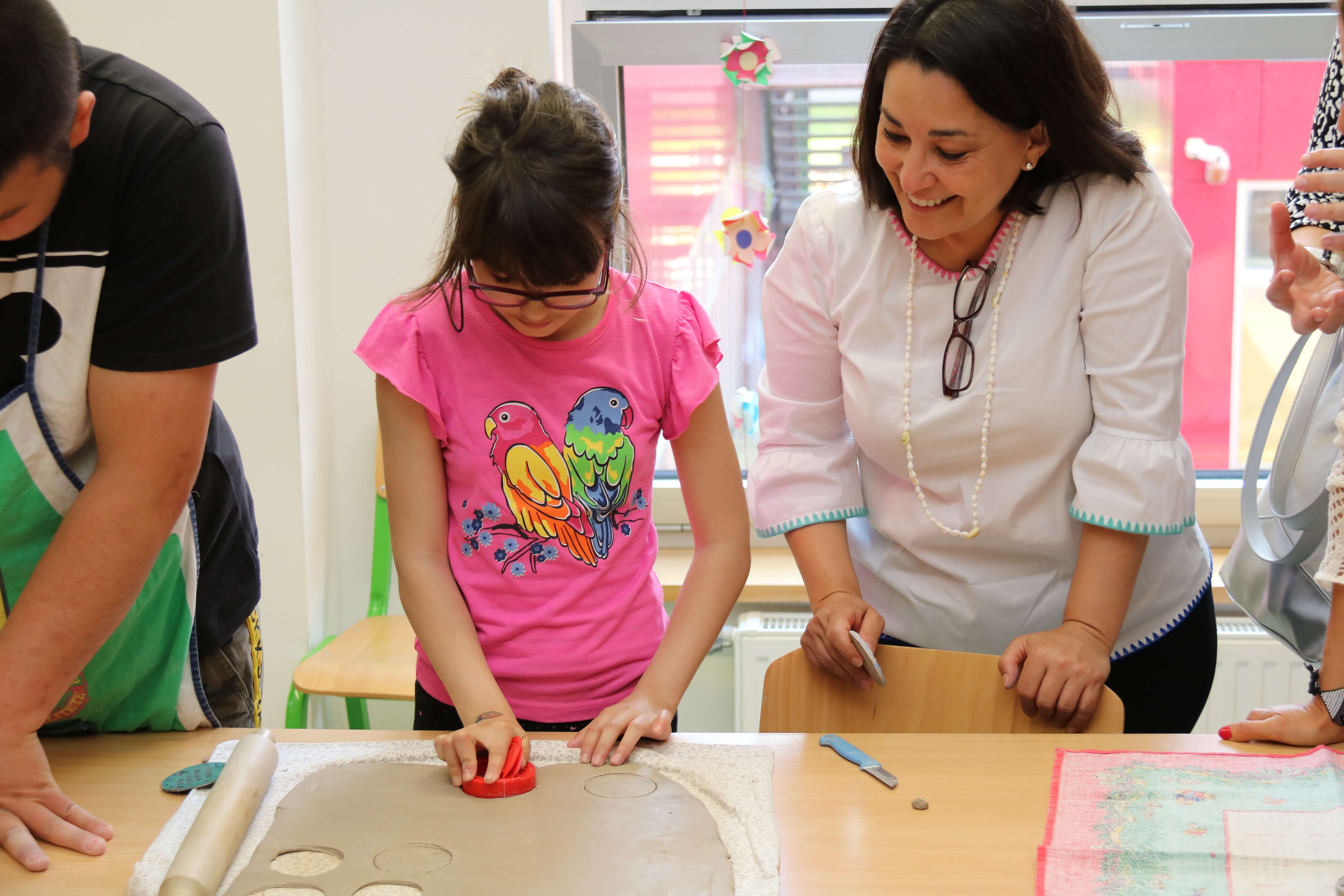
Regina M. Castillo, UNICEF office for Croatia representative with children with disabilities in Centre Tomislav Špoljar in Varaždin © Marin Ilej/UNICEF
The UN is dedicated to seeing this Convention is being respected, and United Nations International Children's Emergency Fund, commonly known as UNICEF, specializes in the issues of children's rights. Established in the aftermath of World War II, UNICEF has been at the frontlines of humanitarian crises, armed conflict, and natural disasters.
„Undeterred by the scale of the crises, we rise to the challenge, reimagine what is possible and respond by helping millions of children survive and thrive. Our on-the-ground expertise has reached more than 191 countries and territories, through committed partnerships and a passion for innovation“, says UNICEF on its official website.
Croatia signed and agreed with the Convention, and UNICEF today has its own office in Zagreb. Furthermore, it's worth noting that UNICEF has existed for 75 years, and despite firstly coming to Croatian territory while the country was part of the former Socialist Federal Republic of Yugoslavia, UNICEF has been with Croatia since the organization was established.
„Many people do not know that UNICEF helped to eradicate malaria in Croatia and that UNICEF played a key role in the development of modern dairy. Dairies were built in Zagreb, Rijeka, and Split, and factories for the production of powder milk in Osijek and Županja. Milk was distributed in schools, and for many children, it was their only meal during the day“, says Regina M. Castillo, UNICEF Office for Croatia representative.
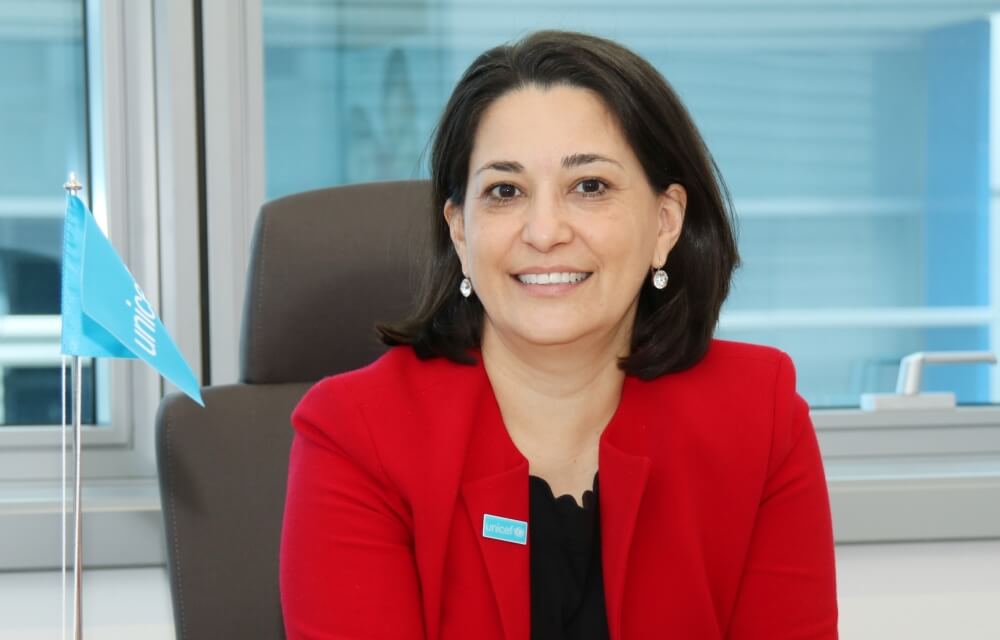
Regina M. Castillo, UNICEF office for Croatia representative © Marin Ilej/UNICEF
The UNICEF representative is elected for a five-year mandate, and Regina M. Castillo came to her function in Croatia in 2019. Her career in the UN started in 2001 and was in charge of economic and social questions in the Executive Office of the UN chief secretary Kofi Annan in New York. This was followed by Castilla moving to work in the mutual program for HIV/AIDS, known as UNAIDS. She was first the director of private sector partnerships in Geneva (2006-2012) and then moved to be the director for Bolivia, Ecuador, and Peru (2012-2015). She majored in International relations and public politics.
Born in Nicaragua, she first started her career in the 1990s as a diplomat, and she was also the headmistress for international trade in the Nicaraguan Trading Ministry.
Helping Croatia before it was cool (or an independent country)
Castillo went on to continue that after World War 2, UNICEF fed six million children every day, which included many children in Croatia.
„One of those children was our dear colleague, prof. Josip Grgurić, who is still working tirelessly for the youngest. He still remembers the yellow cheese that was part of UNICEF's humanitarian package for families, as well as the chocolate that he then tasted for the first time. He later worked at the children's hospital in Klaićeva, which UNICEF helped found, and he still works hard on UNICEF’s Child-Friendly Hospital Initiative“, says Castillo indicating how valuable but also inspiring UNICEF can be to children. Castillo added that in the Homeland War, UNICEF was the first organization on the ground, making sure that children and families received the necessary psychosocial support and humanitarian packages. After the war, they educated children on how to protect themselves from landmines.
Today Croatia developed, joined NATO and EU, and is a modern European country. With such progress, there have been many improvements in respect to children and their rights.
„Croatia has a low mortality rate of children under the age of five, extremely low stunted growth rate due to inadequate nutrition in the first years of life and the enrolment rate of children in primary school is almost 100 per cent“, pointed out Castillo.
„Croatia is an example in the world when it comes to the promotion of breastfeeding. It is rare that all public maternity wards in a country have the status of 'Child-Friendly Hospital'. With the support of UNICEF, partners have organized a network of breastfeeding support groups, and now we have more than 200 support groups in Croatia“, added Castillo on what the world can look up to this small South-Eastern European country.
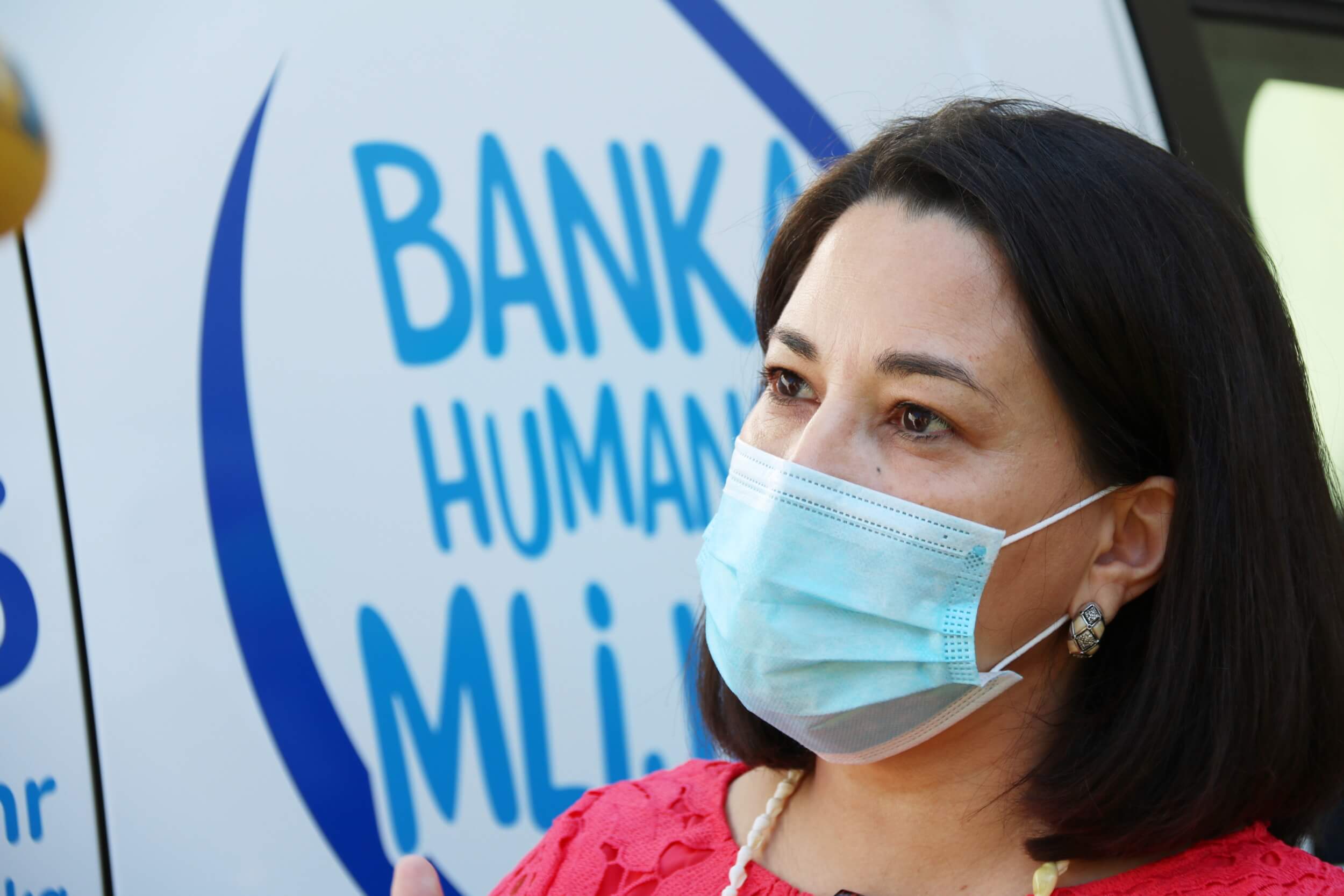
Regina M. Castillo at Human milk bank © Marin Ilej/UNICEF
Still, there are some issues Croatia needs to address and are far from ideal at the moment.
„There are still differences when it comes to access to services for children, depending on where they live and the conditions in which they grow up. Children with disabilities, as well as children from the poorest families, especially in rural areas, often do not have the opportunity to attend kindergarten and do not have the same access to specialized health services and therapies as children in urban areas. The focus of UNICEF in Croatia is on the most marginalized children: children with disabilities or developmental delays, children growing up without adequate parental care, children from minority groups, children at the risk of poverty and exclusion. UNICEF’s programs are focused on the well-being and protection of every child, with a special focus on the most vulnerable children“, pointed out Castillo.
Campaigns and programmes such as “Every child needs a family”, “The first three are the most important”, and “Stop violence among children” are perhaps the most known public action by UNICEF in Croatia, but returning to the good practices of breastfeeding, Castillo emphasizes the establishment of the Human Milk Bank in her current mandate.
„Thanks to the Human Milk Bank, prematurely born and seriously ill newborns (who do not have access to their own mother's milk) can receive milk donated by other mothers. We continually work on reducing the risk of disasters, support the development of quality foster care and provide support to parents in the upbringing and care of children through workshops and we work a lot with young people“, said Castillo.
In general, UNICEF has different types of offices in countries, and regarding the Croatian office, it’s a Country Office. In other words, most of the resources (human and financial) are invested in programs in Croatia. Castillo says that the five-year mandates have priorities that are determined in cooperation with partners. And while 80 percent of the funds raised are invested in programs for girls and boys in Croatia, there are funds and support programs for children outside of the country.
“For example, in 2018, UNICEF supported child health care in parts of Ukraine affected by the conflict and helped the building of five inclusive children's playgrounds in two refugee camps in Jordan in cooperation with the Ministry of Foreign and European Affairs in 2019. Through the ‘Schools for Africa’ program , which includes many kindergartens and schools throughout Croatia, UNICEF supports the education of girls and boys in Madagascar", Castillo listed several examples.

Regina M. Castillo, UNICEF office for Croatia representative with children on Media Literacy days press conference with Radovan Fuchs Minister of Science and Education, Krešimir Partl, State Secretary at Ministry of culture and media and Robert Tomljenović, Deputy Director of the Council for Electronic Media © Marin Ilej/UNICEF
Overall, the UNICEF Office for Croatia works closely with the Croatian Government, and most notably, with the Ministries of Social Welfare, Education, Health, and the Ministry of Foreign and European Affairs. Other partners also include experts (Croatian experts, but also building on expertise and good practice from all over the world), professional associations, academia, services providers, and NGOs.
“UNICEF’s goal is to connect all stakeholders and to advocate and support systemic change for the well-being of all children. System change is a gradual process, and it can be challenging, but when it comes to children’s rights, every step forward is well worth the effort”, explained Castillo.
Croatian citizens showing support for UNICEF
On one hand, Croatia is a good country with low mortality rates of kids and a role model for breastfeeding promotions. On the other hand, however, peer to peer violence (on whose suppression the aforementioned “Stop violence among children“ campaign works heavily on), and unequal approach to education between rural and urban areas show Croatia has both its ups and downs. Unfortunately. The downside sometimes overshadows all the positive things.
One such instance was the tragic death of a two-year-old girl from Nova Gradiška on Easter Sunday. The death of a severely injured girl, who was brought to Zagreb's children's hospital after suffering abuse and heavy beating from her biological parents (and from whom the girl was taken and given to a foster family but was then returned back to biological parents), sparked controversy and citizens outrage, culminating in changes in social welfare law, as well as sacks and investigations in the welfare center in Nova Gradiška.
„We are deeply saddened by the tragic death of two-and-a-half-year-old Nikoll on Easter Sunday. There are no words to express the pain of such a terrible event. Unfortunately, there are no simple and quick solutions to prevent violence against children. For years, UNICEF in Croatia has been continuously and persistently working in the field of child protection, educating experts from the social welfare system, but also other experts who work with children and families, such as experts from the health care, education, and justice systems. UNICEF implements various support programs for parents, and it is fully committed to the development of foster care and the improvement of the legislative framework. However, UNICEF is also aware that society as a whole, has a long way to go to achieve the goal that every girl and every boy is guaranteed the best possible care and protection. UNICEF will continue to work actively, persistently, and dedicatedly with all partners to achieve it”, commented Castillo.
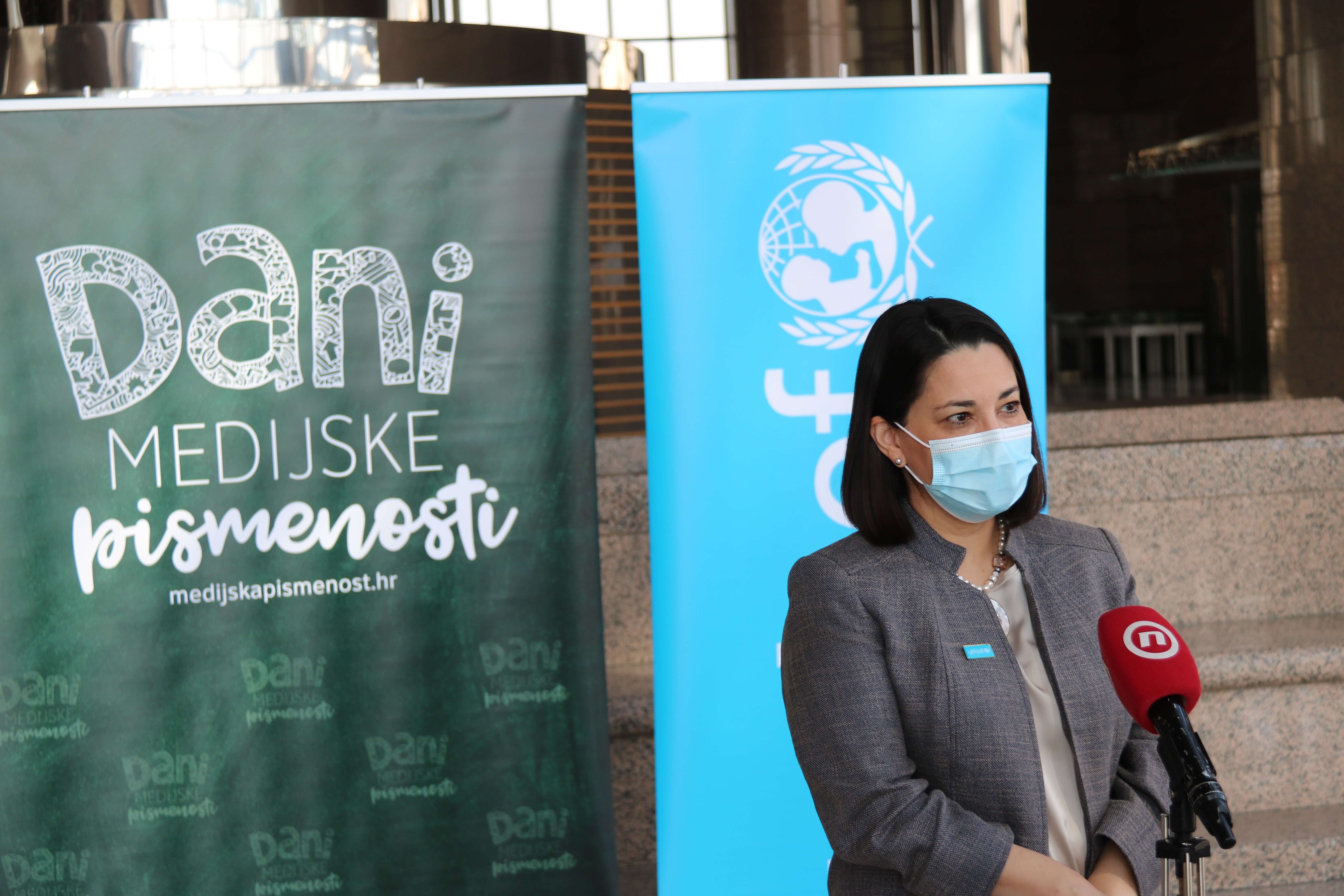
Regina M. Castillo talking on Media Literacy days press conference © Marin Ilej/UNICEF
However, Croatians recognize the importance of the UNICEF mission. Before Covid, UNICEF annually collaborated with the Museum of Illusions on the Museum of Reality exhibition which displayed the problems children faced worldwide, but which also showed what changes and solutions UNICEF brought to those areas.
“Experience tells us that citizens are ready to support the youngest, in Croatia and beyond. Implementation of our programs would not be possible without the support from citizens and companies that placed the focus of their CSR activities precisely on children. We especially value the support from our Childhood Guardians, donors who support our work with regular monthly donations and allow us to regularly conduct our programs for boys and girls, as well as react quickly with much-needed assistance in crisis situations like the earthquakes in Croatia and the COVID-19 pandemic that affected all families. UNICEF is always in the field with the most vulnerable children and their families”, notes Castillo.
In the end is important to note, that while children are recognised as a particularly vulnerable group, all human rights apply equally to children.
“All the rights enshrined in the Convention apply to every child, regardless of a child’s country of origin, gender, religion, and nationality. Every child, by birth, has all his/her rights, the right to grow up in a safe environment, to have a family, to have access to health care and education, to be able to play and develop his/her interests and reach his/her full potential”, concludes Castillo.
The five-year mandate is an agreement that sets priorities in advance, so Castillo warned that there is no opportunity for making donations outside of that framework. UNICEF office occasionally does get messages from citizens who need advice or help on issues outside of that frame, but nevertheless, UNICEF can offer them help by referring them to institutions and addresses that can offer citizens the necessary support, financial support, or information.
With expertise mentioned several times throughout this story as the insurance of delivering the best solutions to issues children face, UNICEF is always on the lookout for new people. If you want to make a change in the world while earning a fair wage yourself, check out what expertise UNICEF is looking for right now.
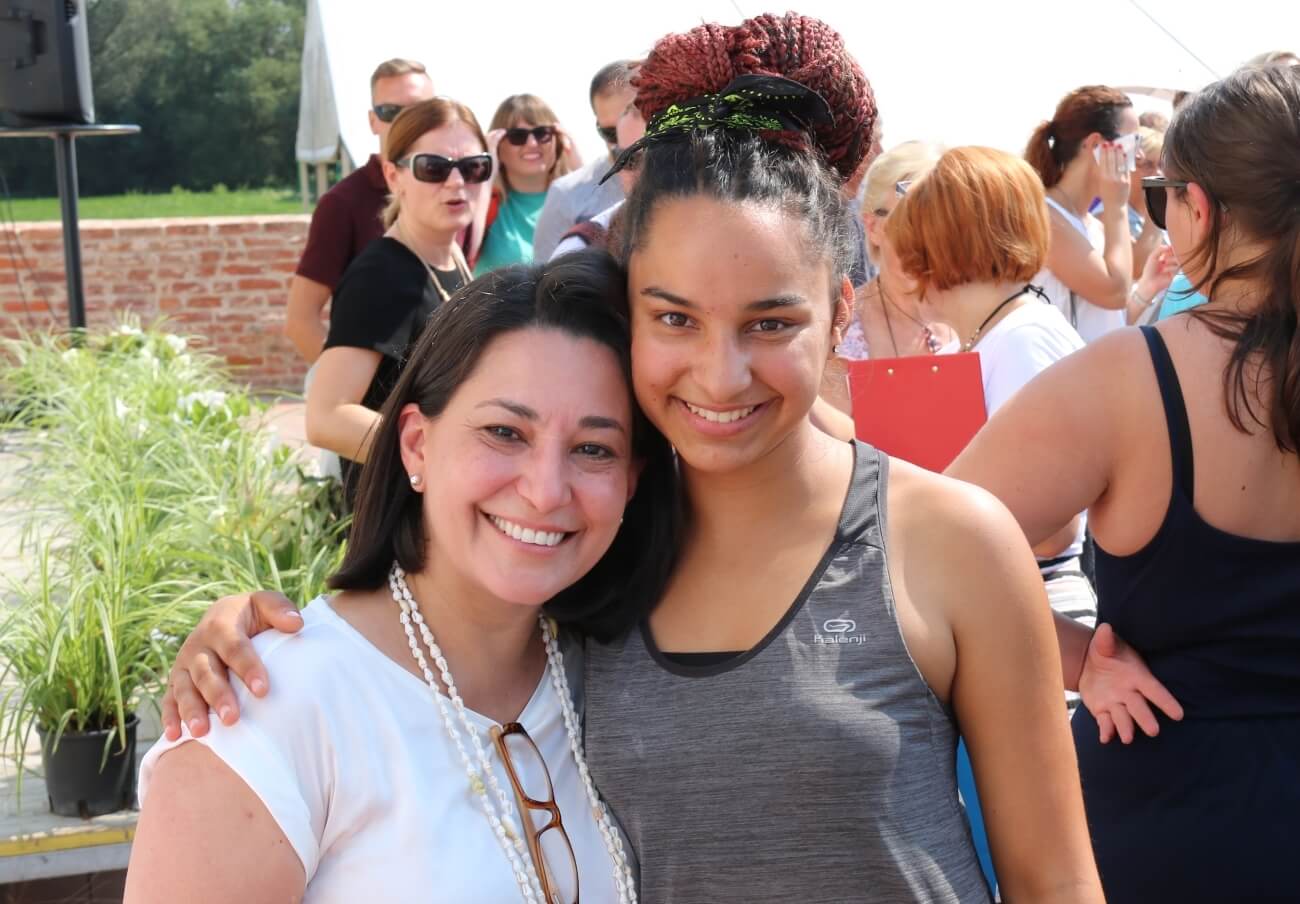
Regina M. Castillo on a foster family gathering © Marin Ilej/UNICEF
UNICEF Croatian Office is situated on Radnička cesta 41/7. To inform the public of their work, they built a considerable presence on Facebook, Twitter, Instagram, Youtube, and Linkedin. You can also find all UNICEF-related info for Croatia on their official website, and contact them via mail: This email address is being protected from spambots. You need JavaScript enabled to view it. or on phone numbers: +385 1 2442 660 and +385 1 2442 661. You can use the website to donate to a cause in Croatia too. Additionally, there are numbers: +385 1 4095 855, +385 99 2692 196, and +385 91 621 1039 for more details on donating to Croatia as well as e-mail address This email address is being protected from spambots. You need JavaScript enabled to view it.. You can also leave a donation to UNICEF in your will, and a phone number +385 1 3031 640 specializes for the issue in Croatia. If you find yourself in Croatia and you want to volunteer for UNICEF, more info can be found by sending a mail to This email address is being protected from spambots. You need JavaScript enabled to view it. and on phone number +385 1 3031 646.
And of course, you can donate for a good cause to UNICEF for any action the fund is internationally involved in.
To read more from the series "Friends of Croatia", follow TCN's dedicated page.
For more about UNICEF in Croatia, follow TCN's dedicated page.
Faculty of Science (PMF) Donation: Five New Laptops For Faculty of Metallurgy in Sisak
May 25, 2021 - Following the issues caused by the earthquake in Petrinja, a Faculty of Science (PMF) donation o the Faculty of Metallurgy in Sisak ensured five laptops for students that need them the most.
The devastating 6.3 earthquake that hit Banovina / Banija on December 29 saw Croatia still have a troubling situation in Petrinja, Baranja, Glina, and other places, which also attracted huge public interest regarding voters mood in those areas on local elections.
The need for help and donations is still for rebuilding and restoring functional infrastructure is still needed, and on top of it all, it's one of the poorest regions in the whole country. Sadly, that also goes for the students of the Faculty of Metallurgy, the University of Zagreb, which is based in Sisak.
As reported by the official website of the Faculty of Science (PMF) at the University of Zagreb, the Metallurgy Faculty dean, dr. Zdenka Zovko Brodarac wrote to PMF asking for a donation for five functional computers for their students of weaker economic status, coming from quake-hit areas. Computers are even more needed due to the coronavirus pandemic; online classes are ever-present in the education of the new generations of Croatian experts and intellectuals.
„PMF knows that the big demands of online learning are put before students, and it's very challenging to deal with that form of learning, particularly for families with lower incomes. To ensure quality participation in online learning, PMF decided to donate five laptops“, informed PMF.
Student representatives and the deans of two faculties were present while receiving computers. Zovko Brodarac thanked them for the computers promising they will find their way to those who need them the most, while PMF dean dr. Mirko Planinić pointed out that he supports all activities regarding education and youth, and overall raising the living standards of people in the area.
PMF is the home to the geophysical department, whose domain of scientific interest also includes earthquakes. Furthermore, within the department operates a Croatian Seismological Survey that collects and analyzes these powerful forces of nature in Croatia – both in their most destructive editions and in unnoticeable ones too. The shocking aftermath saw Croatian authorities taking the threat more seriously, and as TCN reported earlier in 2021, acquiring new equipment for measuring seismic activity that was placed on Petrinja cemetery.
The Metallurgy Faculty in Sisak saw its constitution as an independent unit within the Zagreb University on February first, 1979, while its scientific-educational council was established a year earlier, specifically on November 3rd, 1978. This was an answer to the educational need to meet the industrial development of Sisak, which in Croatia remains a synonym for the heavy industry even today.
The faculty offers education for metallurgy (specializations for metallurgical engineering and industrial ecology on bachelor level), as well as workplace security and health studies (major level), and the course on metallurgy engineering (machinery. shipbuilding, and aircraft).
Did you know that an hour and five minutes drive from Sisak is Lonjsko Polje Nature Park? Learn more on our TC page.
For more about education in Croatia, follow TCN's dedicated page.
Coca-Cola Donates HRK 150,000 to Sisters of Charity Hospital Tissue Bank
ZAGREB, 10 May 2021 - Coca-Cola HBC Croatia has donated HRK 150,000 to the Blood Transfusion and Regenerative Medicine Unit at Zagreb's Sisters of Charity Hospital, to be used to purchase a tissue freezer, which will facilitate the work of experts at the Tissue and Cell Bank clinic, the company said on Monday.
The freezer can be cooled down to -86 degrees Celsius and it will be used to store tissue to be used throughout Croatia.
The donation is a contribution to a project intended to modernize and equip the clinic to expand its activities to four new types of therapy, including therapy with stem cells, the company said, noting that the donation will improve the safety, quality control, and efficacy of the therapy as well as achieve scientific excellence aimed at employing young researchers.
Hospital director Mario Zovak thanked Coca Cola for the donation, saying that the full potential of the hospital's contribution and introduction of new types of tissue and cell therapy was considerably limited due to a lack of equipment as well as inadequate space as the hospital premises were damaged in last year's earthquakes.
(€1 = HRK 7.526977)
For more, follow our lifestyle section.
INA to Donate HRK 1.4 Million To Healthcare Sector
ZAGREB, 5 May, 2021 - The INA oil company will donate HRK 1.4 million to healthcare institutions this year, aware of the exceptional circumstances that the system is faced with due to the coronavirus pandemic, the company said in a press release on Wednesday.
In the wake of last year's earthquakes in Sisak-Moslavina County, INA has donated HRK 500,000 to the Sisak General Hospital and an additional HRK 900,000 to other institutions.
INA plans to donate HRK 150,000 each to the Oncology Department of the Hospital for Children's Diseases in Zagreb and the Clinical Hospital Centre (KBC) in Rijeka as well as HRK 100,000 each to KBC Osijek, the tissue and cell bank at the Sisters of Mercy Hospital in Zagreb, the Hospital for Infectious Diseases in Zagreb, the Cardiology Clinic in Split and two civil society associations.
The Sisak Health Care Centre and the Special Children's Hospital in Gornja Bistra will receive HRK 50,000 each.
The donations are intended for the improvement of diagnostics, procuring new equipment and improving accommodation for patients and working conditions for medical workers.
In addition to money donations, the hospitals will receive a total of 500 litres of INA's Dezinol disinfectant which was developed by INA during the pandemic.
In the past 10 years INA has invested HRK 6.5 million in healthcare in Croatia.
(€1 = HRK 7.5)
For more about business in Croatia, follow TCN's dedicated page
The State Electoral Commission (DIP) Tells Donors to Respect Law, Take Note of Allowable Amounts for Electioneering
ZAGREB, 16 March, 2021 - The State Electoral Commission (DIP) has advised companies and citizens who intend to make a donation to participants running in the May local election, to respect the law and take note of the maximum allowable amount that may be donated.
All physical and legal persons intending to donate money, products or services are obliged to register all the relevant information and should be issued with a receipt by the recipient party or independent slate.
Donors must not have any debts to the state or local authorities.
If donations are made in products, then the value of these must be identified.
The maximum amount of a donation for physical entities is HRK 30,000 and for legal entities HRK 200,000. Donations can be made once or in several instalments and must be pad into a separate electioneering account.
Contracts for donations greater than HRK 5,000
Donations of HRK 5,000 or more require a contract to be concluded between the donor and recipient (party or independent slate).
DIP has published guidelines regarding the financing of electioneering which are available at its website.
For more about politics in Croatia, follow TCN's dedicated page.
Croatia Civil Protection Authority Gives Instruction for Aid Delivery from Abroad
ZAGREB, 4 January, 2021 - Croatia's Civil Protection Authority on Sunday presented instructions for better organisation of the delivery of humanitarian aid from abroad.
Donors and organisers of relief aid shipments are asked to provide their data on the e-mail address: This email address is being protected from spambots. You need JavaScript enabled to view it.. before they depart for Croatia.
They are kindly asked to give information about the identity of drivers and other persons engaged in the transport of the aid as well as the registration numbers and kinds of vehicles they are using for the transport.
For instance, the information on whether vehicles are higher than four metres is also necessary.
The providers of the assistance are also asked to announce the border crossing they are going to use as well as the date of the of their planned arrival and departure from the country.
Also, information on the route to their destination is necessary for the better organisation and smooth traffic as well as for the exemption of aid delivery organisers from toll payment.


